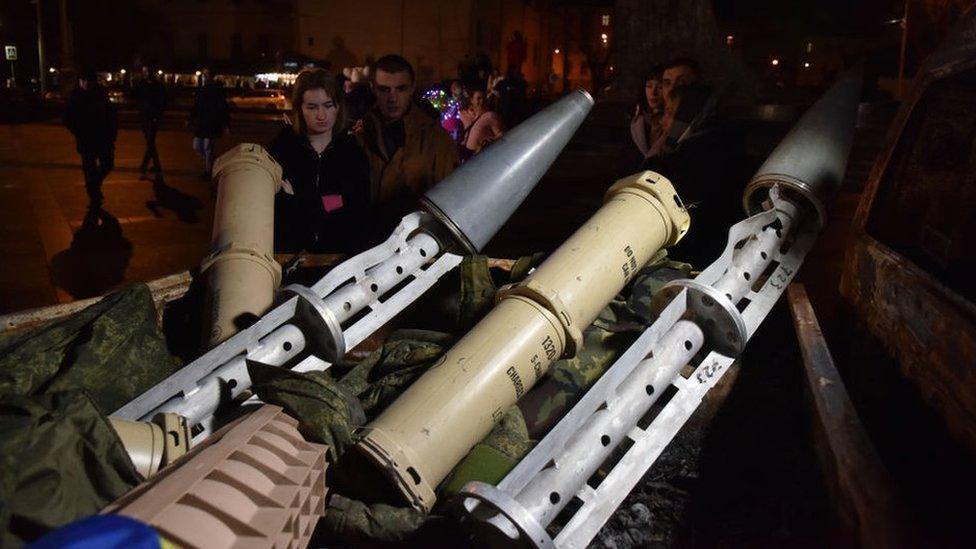Makiivka: Russia blames missile attack on soldiers' mobile phone use
- Published
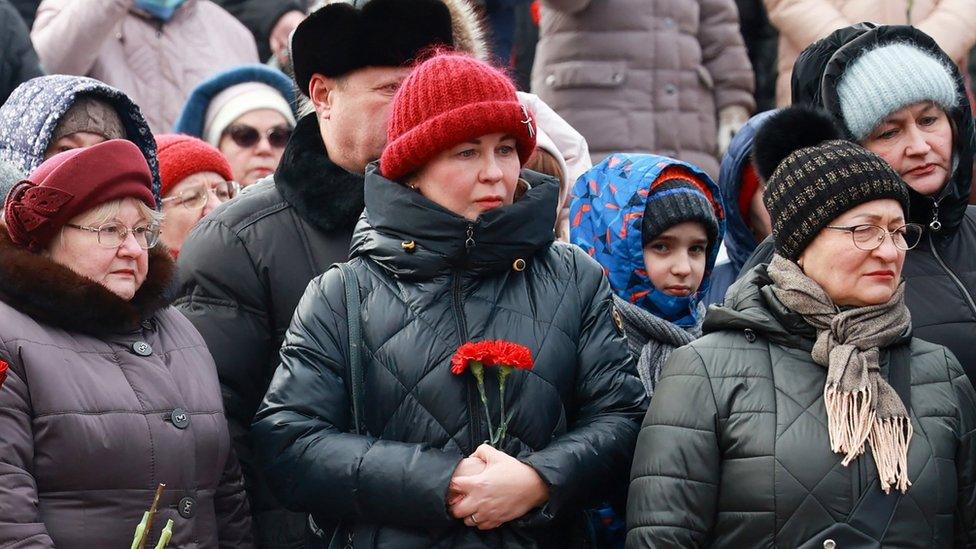
Mourners gather to lay flowers in memory of soldiers killed in Makiivka
Russia has said a new year missile attack that killed at least 89 Russian soldiers happened because troops were using mobile phones, defying a ban.
Turning on the phones and massive use of them allowed the enemy to locate its target, officials said.
Ukraine says 400 soldiers were killed - and another 300 wounded - in the attack on a college for conscripts in Makiivka, in the occupied Donetsk area.
It is the largest number of deaths Russia has acknowledged in the war.
Russia said that at 00:01 Moscow time on New Year's Day, six rockets were fired from a US-made Himars rocket system at a vocational college, two of which were shot down. Moments earlier President Vladimir Putin had given his annual new year address on Russian TV.
The deputy commander of the regiment, Lt Col Bachurin, was among those killed, the ministry of defence said in a statement on Wednesday. A commission was investigating the circumstances of the incident, the statement said.
But it was "already obvious" that the main cause of the attack was the use of mobile phones, external by troops in range of Ukrainian weapons, despite this being banned, it added.
"This factor allowed the enemy to locate and determine the co-ordinates of the location of military personnel for a missile strike."
Lt Gen Sergei Sevryukov said officials found responsible by the investigation would be brought to justice and "all the necessary measures are currently being adopted to prevent this kind of tragic incident in the future".
The defence ministry's statement was striking for two reasons.
The military's official death toll is now 89. The previous figure of 63 dead already represented the highest single loss of life Moscow had admitted since the war began. The real death toll in Makiivka could be much higher, as is claimed by both Ukraine and by unofficial Russian sources.
Second, the statement said that "responsible officials" would be brought to justice, suggesting that something went wrong. This is highly unusual behaviour for Moscow - very rarely do authorities admit that errors have been made.
The vocational college was packed with soldiers at the time - men believed to have been among the 300,000 called up in President Vladimir Putin's partial mobilisation in September. Ammunition was also being stored close to the site, which was reduced to rubble.
The head of Russia's proxy authority in the Donetsk region, Denis Pushilin, praised the heroism of those caught up in the missile strike, who he said had tried to pull comrades out of the building. Some of those returning to the building had died in the process, he added.
With such a high official death toll, one would think the Russian military's latest update on the horrific events in Makiivka would be the top story on Russian state TV news today.
Not so. There was almost no mention of the story on Rossiya-24's main bulletins this morning.
Over on Channel One, the main news programme did briefly mention the defence ministry statement, but chose to bury it at the end of a report about alleged victories on the front line and losses amongst Ukrainian, not Russian, forces.
"A whole series of Russian missile attacks was unleashed on the first days of the new year against Ukrainian nationalists and foreign accomplices of the Kyiv regime," said the Channel One correspondent triumphantly, using common false narratives to describe Ukrainian forces.
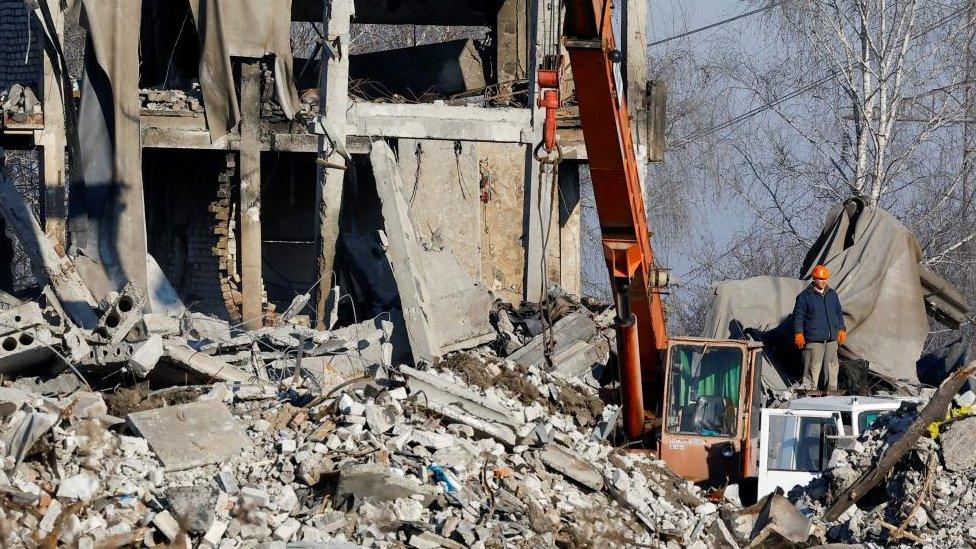
The building housing the conscripts was all but flattened in the Ukrainian attack
But if you switch off the TV and log on to vKontakte, Russia's version of Facebook, you get a very different picture.
Communities have sprung up where soldiers' relatives are organising, appealing for information and crowdfunding for troops on the front line. Here there is anger.
Many relatives of the Makiivka soldiers blame military officials for the incident, and are sceptical of reports that those guilty will be punished. Some question why Kremlin-controlled media are largely silent on the story. However, there is little direct criticism of President Putin or of the war in general.
Pavel Gubarev, a former leading official in Russia's proxy authority in Donetsk, said the decision to house a large number of soldiers in one building was "criminal negligence". "If no-one is punished for this, then it will only get worse," he warned.
The deputy speaker of Moscow's local parliament, Andrei Medvedev, said it was predictable that the soldiers would be blamed rather than the commander who made the original decision to put so many of them in one place.
The defence ministry's claim that military officials who were allegedly responsible for this disaster will be punished will be seen as an attempt to defuse public anger over the disaster in Makiivka, but also to place the blame firmly on the military, and not President Putin. He has yet to respond to the disaster so far,
Throughout this war, the Kremlin has been careful to distance Russia's president from any bad news coming from the front line.
In November, Russia withdrew from the southern Ukrainian city of Kherson, a major strategic defeat for Moscow. The announcement to retreat, though, was made by Gen Sergei Surovikin, commander of Russian forces in Ukraine. President Putin was meanwhile pictured touring a neurological facility, and did not make any comment on the situation in Kherson.
Ukrainian President Volodymyr Zelensky warned on Tuesday night that Moscow was "on the eve of new mobilisation processes".
Declaring that "their new offensive must fail", Mr Zelensky said Ukraine had no doubt Russia would throw everything they had left and everyone they could muster in a bid to turn the tide of the war.

Related topics
- Published3 January 2023
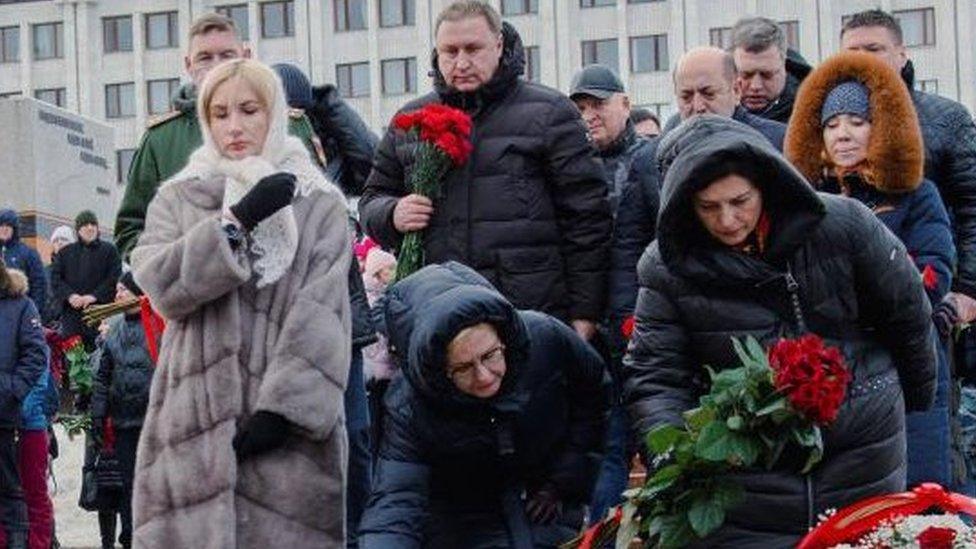
- Published3 January 2023
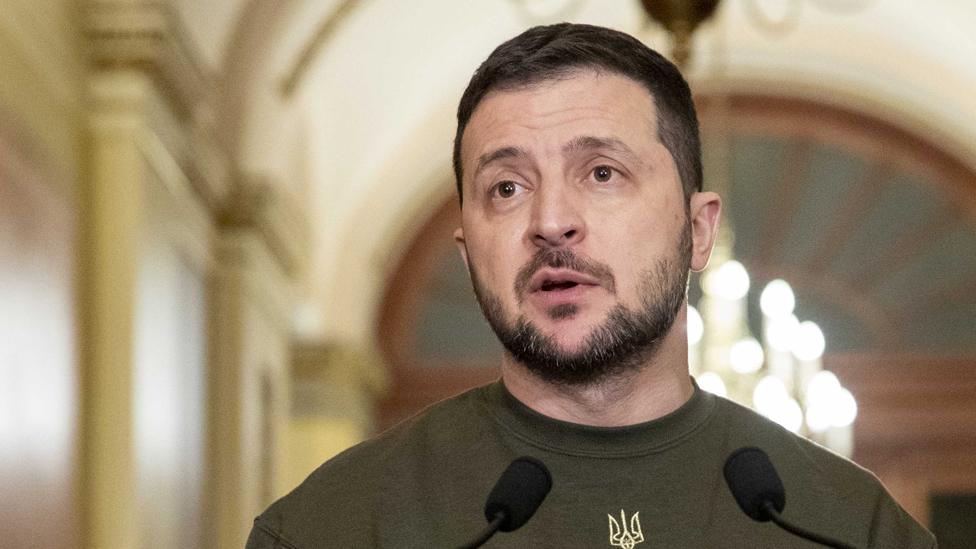
- Published1 January 2023
